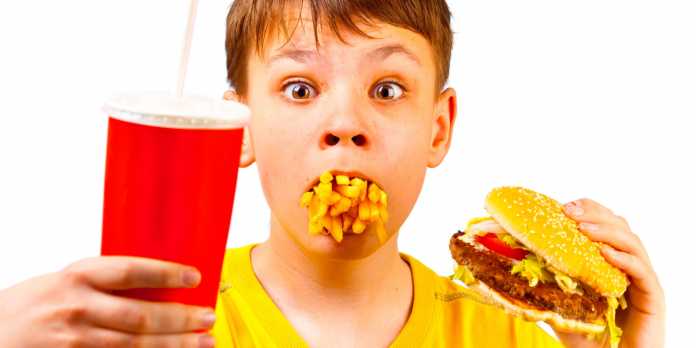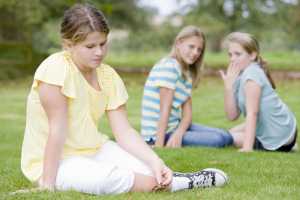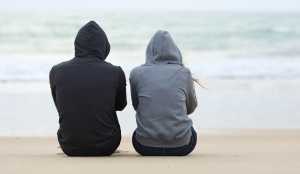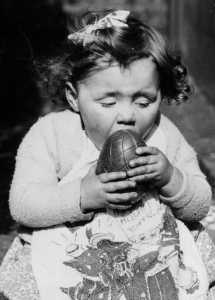
The fat of the land
As I mulled over my condition, tried to figure out the cause of my malaise, I absent-mindedly reached for the purple wrapper beside my bed. Without thinking, I deposited its contents into my mouth. Gradually, almost imperceptibly, my thoughts became clearer. The sweating stopped, as did the shivering. All the aches and pains disappeared. I was cured. Putting the half-eaten Easter Egg back on the locker I turned over and went back to sleep.
The chocolate has since run out, and I’ve been forced to confront my demons, forced to go cold turkey. It hasn’t been easy, but I’m over the worst of it now. Next year I’ll ration myself, restrict myself to two, maybe three, eggs a day, and hope that, with the right kind of support, I can prevent this happening again. It’s going to be difficult though, you can get five of them for a tenner nowadays.
Ireland is one of the most obese nations in Europe with one in four Irish adults classed as being severely overweight. This figure is reciprocated in our children, where, again, one in four are categorised as obese. And we’re getting fatter. Because obese children, more often than not, become obese adults. Current estimates predict that, by the year 2025, we’ll be the fattest country in the EU.
The knock-on effect on our economy, and on our health service, is something which, right now, we can only speculate about. But with proven links to heart disease, type 2 diabetes and cancer, among others, this imminent ‘obesity epidemic’ is set to have far-reaching implications across all facets of Irish society. That this should happen to a country with a history of famine, where scarcity and lack of resources are part of the culture, is the ultimate irony.
Health issues aside, an equally worrying trend has emerged from within the corridors of our primary and secondary schools. There, obese children are bullied because of their size, with as many as 60% reporting being singled out and harassed due to their weight. Furthermore, one in ten children referred to the obesity service in Dublin’s Temple Street Hospital admitted missing days because of this bullying. It’s not enough that these children may grow up to have health problems, they are also losing out on an education due to their size.

If someone happens to be overweight, whether adult, child or otherwise, it’s not anyone’s fault. It’s not a case of tracking down the guilty party and summoning them to court to answer for their crimes. No. The reasons for obesity are as varied as they are complex. Yes, poor diet, overeating and lack of exercise are the core contributors, but those behaviours are often a result of secondary factors like low-income, poor social housing, depression, grief, genetics, medical conditions and excessive alcohol consumption, sedentary work environments and lengthy commutes.
In some ways it’s a wonder we’re not all obese. Everything, from the way we consume entertainment to the way we shop for food, is geared towards minimum effort, towards instant gratification, on hitting those pleasure sensors and releasing jolts of dopamine into our collective bloodstreams. Indeed, you could argue that only the luck of the draw determines those who live in fear of the weighing scales and those who don’t.
Having established that blaming one another achieves nothing, and that our expanding waistlines are not, as is often assumed, the result of all-out gluttony, the only question which remains unanswered is what we do now? Well, we could introduce a sugar tax I suppose, raise the price of soft drinks by a few cents and congratulate ourselves for being so fantastically forward-thinking. And that’s what Finance Minister, Michael Noonan, intends to do from April of next year.
I shouldn’t grumble I suppose, it’s a start if nothing more. But penalising those who produce the goods which make us fat isn’t the answer, and unless you double, treble or quadruple those prices it won’t make a blind bit of difference. Perhaps we’ll reach that stage eventually, where priced-out Lilt addicts are forced to turn to the black market to experience the totally tropical taste at an affordable price, but that’s a long way off, and unlike, say cigarettes, sugar comes in many different, often delightful, forms.

Our education board, and the teachers it serves, may have a lot of its hands right now, but given its willingness to amend the Junior Cert to reflect, not only public opinion, but the needs of it students, it’s not a huge stretch to ask that it help tackle this ongoing obesity crisis. You could argue that it’s not the school’s job to inform children what they should and shouldn’t eat, that that’s the sole responsibility of the parents, but the days of trudging into class for another interminable sermon on Shakespeare or Yeats are long gone.
Schools are no longer just places of learning, somewhere to get the certificate which enables you to go the next school to get the better certificate. Or at least they shouldn’t be. They should be places where children can learn about life, about the world, about the kinds of foods they should be eating and the kinds of foods they shouldn’t, basic stuff which some take for granted but many never learn. If we could somehow do that, if we could help our children to understand why some people are overweight and some aren’t, we’d not only prevent this obesity epidemic from ever happening, we’d also ensure they stopped bullying one another over a few extra kilos.
Plenty of fish

Yet despite these overwhelming odds, despite there being at least a billion eligible people to choose from, two American twins have managed to marry each other.
And no, this isn’t one of these strange stories from Hicksville, USA, where wedding your cousin and fathering your uncle is the norm. Instead it’s the rather tragic tale of two adoptees who, having been separated at birth, met at college and embarked upon a relationship which led to marriage.
They may have lived out their days in blissful ignorance, completely unaware of how ‘icky’ their coupling was, were it not for their inability to conceive, a problem which brought them to an IVF clinic in Mississippi.
There, having examined their respective DNA, doctors were forced to reveal the horrible truth to the pair; that, far from being Mr and Mrs, they were actually brother and sister. Having initially thought they were the victims of an unfunny prank, the long-lost siblings were forced to accept the reality of their situation, a situation which finally explained why they looked alike and shared a birthday.
On the plus side however, local authorities have decided not to charge them for incest due to the unusual nature of their case. So, all things considered, it could have been worse.



